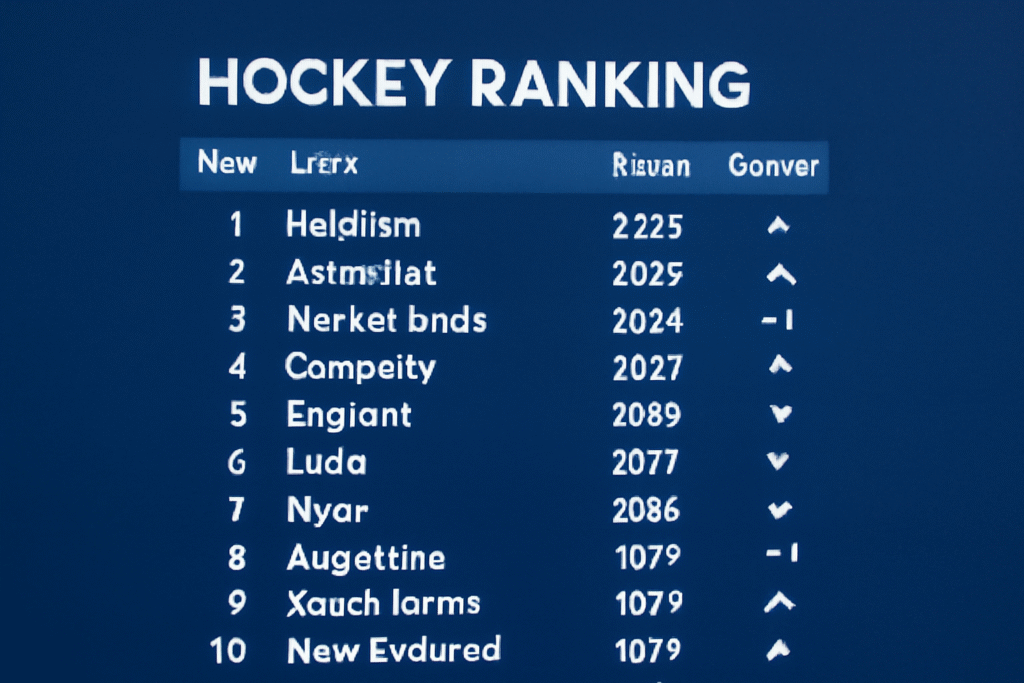Hockey Ranking: A Complete Guide to Understanding Hockey Rankings
Hockey ranking is a crucial aspect of the sport, helping teams and players to track their progress and performance over time. Whether you’re a die-hard fan or someone just getting into the sport, understanding hockey ranking systems is key to following the game at a deeper level. In this blog post, I’ll walk you through everything you need to know about hockey ranking, from how they are determined to why they matter.
What is Hockey Ranking?
Hockey ranking refers to the system used to determine the position of teams or players in the sport based on their performance. Rankings are used in various forms of hockey, including ice hockey, field hockey, and even indoor hockey. These rankings are updated regularly, often after significant competitions or tournaments, and provide a clear picture of where teams and players stand in terms of their abilities and achievements.
The two main types of hockey ranking systems are:
- Team Rankings:
These rankings are determined by how well national or club teams perform in various international and domestic competitions. - Player Rankings:
These are specific to individual players and are often based on their performance in tournaments or matches, including goals scored, assists, and other statistics.
The Importance of Hockey Ranking
Hockey rankings are important for several reasons, including:
- Seeding in Tournaments:
Rankings often determine how teams or players are seeded in major tournaments, including the Olympics, World Cup, and continental championships. - Qualification for Major Events:
Many international competitions, including the Olympics and the FIFA World Cup, require teams to meet specific ranking criteria for automatic qualification. - Motivation and Recognition:
High rankings can boost a team’s or player’s morale and provide recognition for their hard work and success on the field. - Sponsorship and Media Coverage:
Teams and players with higher rankings are often more attractive to sponsors and media outlets, which increases their visibility and commercial opportunities.

Wanna explore much more related to Football, Golf, Cricket, and all popular sports?
Visit us today at Sportsinfoo.online
How is Hockey Ranking Determined?
The determination of hockey rankings can vary depending on the type of competition (e.g., international vs. domestic) and the governing body overseeing the event. However, most ranking systems follow a similar methodology that involves accumulating points based on performance in specific tournaments or competitions.
1. FIFA Hockey Ranking System (For International Teams)
The FIFA hockey ranking system is one of the most widely used systems for ranking national teams. For this system:
- Points are awarded based on match results in major international competitions, including the World Cup, Continental Championships, and Olympic Games.
- Teams earn more points for winning higher-level tournaments and for beating higher-ranked teams.
- Rankings are updated regularly, typically after each tournament or competition.
2. Elo Rating System (For Individual Players)
The Elo Rating System is used to rank individual players and teams based on their performance in matches. Under this system:
- Points are earned and lost based on match results. A win against a higher-ranked player results in more points than a win against a lower-ranked player.
- Elo ratings are recalculated after every match, making it a dynamic and accurate reflection of a player’s current form.
3. Points Accumulation in Domestic Leagues
In domestic leagues, hockey rankings are often based on the number of points teams accumulate throughout the season. In ice hockey, for example:
- Wins and losses are tallied into points.
- Additional points are awarded for overtime wins or shootout victories.
- Standings are adjusted weekly or bi-weekly to ensure the rankings reflect the latest results.
Understanding Hockey Rankings for Different Formats
1. Ice Hockey Rankings
Ice hockey rankings are determined by the International Ice Hockey Federation (IIHF). Teams are ranked based on their performance in events such as the IIHF World Championships, Olympics, and other international tournaments. The NHL rankings for club teams are determined by their performance in the league and playoffs.
2. Field Hockey Rankings
Field hockey rankings are overseen by the International Hockey Federation (FIH). Similar to ice hockey, rankings are based on team performances in international competitions such as the FIH Hockey World Cup and the Olympic Games. Field hockey rankings also take into account tournaments held in different regions.
3. Indoor Hockey Rankings
Indoor hockey rankings are generally governed by the International Hockey Federation but focus specifically on indoor events. The rankings are based on how teams perform in indoor championships and tournaments.

If you're interested in Tennis passion and power, explore now
The Role of Hockey Rankings in International Competitions
Hockey rankings play a significant role in international competitions. These rankings determine which teams qualify directly for prestigious tournaments such as the FIFA Hockey World Cup, Olympic Games, and Continental Cup. For example:
- The top-ranked teams in the FIFA Hockey World Rankings automatically qualify for tournaments, such as the World Cup or the Olympics.
- Lower-ranked teams must go through qualification tournaments or other pathways to earn a spot in major competitions.
In addition, hockey rankings affect the seeding of teams in these tournaments. High-ranked teams typically receive favorable seedings, meaning they are placed in different groups from other top-ranked teams, thus improving their chances of advancing to the final stages of the tournament.
The Future of Hockey Rankings
As the sport continues to grow globally, hockey rankings will likely become even more important. New ranking systems may be developed, and advancements in technology could make the process even more accurate and transparent. There’s also the possibility of further expansions in the number of tournaments, which could provide more opportunities for teams and players to earn ranking points.
Moreover, the rise of new powerhouses in hockey may disrupt current rankings, leading to greater competition and excitement.
Final Thoughts:
The hockey ranking system is crucial in shaping the future of the sport, as it determines which teams and players rise to the top. As fans, it’s important to follow these rankings to stay up to date with the best players and teams. The rankings offer not only a glimpse into the world of hockey but also provide a deeper understanding of the competition, strategy, and success within the sport.



